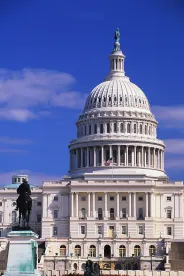With Washington undergoing a transformation the likes of which has not been seen in decades, House Judiciary Committee Chairman Bob Goodlatte recently outlined his committee’s priorities for the 115th Congress. Speaking at an event sponsored by the Federalist Society at the National Press Club in Washington, D.C., Chairman Goodlatte outlined a vision extending from intellectual property to the nation’s borders and provided a road map for business leaders of important regulatory law issues on which to focus.
Regulatory reform: Chairman Goodlatte stressed the importance of reforming the nation’s rules and rulemaking, particularly for small businesses. Declaring that the cost of excessive regulation reaches nearly $2 trillion annually, or $15,000 per U.S. household, he noted that the committee has passed a series of bills to reign in red tape and provide transparency, and that the House had approved these bills in January. They are:
-
H.R. 5, the Regulatory Accountability Act of 2017, would change administrative rulemaking procedures, consolidating six earlier bills aimed at reforming the regulatory process. Federal agencies would be required to choose the lowest-cost rulemaking alternative that meets statutory objectives, and would be required to make all preliminary and final factual determinations based on evidence and public hearings of the evidence before any protective regulations are put into place. The act also would repeal the Chevron and Auer doctrines, necessitating de novo review of agency action in all circumstances – which supporters say reasserts the separation of powers. Chairman Goodlatte, the sponsor of the bill, stressed that overturning such deference to the agency would make it more likely that congressional intent is reflected in court decisions.
The act, which is worth reading in full detail, would also change rules specifically for small businesses, require the Office of Information and Regulatory Affairs (OIRA) to determine whether a new rule would cost the economy at least $1 billion annually and require that each federal agency submit monthly reports that include rules the agency expects to propose or finalize within the following 12 months.
Enactment of H.R. 5 would amount to sweeping reform for businesses across nearly all sectors of the economy. Further, by putting an end to the deference afforded agencies by the Chevron and Auer doctrines and giving more oversight of agency action to the judicial branch, the bill would overturn decades of legal precedent. The bill has currently been referred to the Senate Committee on Homeland Security and Governmental Affairs.
-
H.R. 21, the Midnight Rules Relief Act of 2017, would amend the Congressional Review Act to allow lawmakers to bundle together multiple rules and overturn them. Specifically, this would target regulations instituted during the final year of a president’s term. It would help Congress move more quickly to undo parts of major programs, such as the Affordable Care Act, which have deep regulatory roots in addition to statutory requirements. The bill passed the House on January 4, 2017, and currently awaits debate in the Senate.
-
H.R. 26, the Regulations from the Executive in Need of Scrutiny Act of 2017, would revise provisions related to congressional review of agency rulemaking. Specifically, a federal agency promulgating a rule would have to publish information about it in the Federal Register and include in its report to Congress and to the Government Accountability Office both a classification of the rule as a major or non-major rule, and a copy of the cost-benefit analysis of the rule that includes an analysis of any jobs added or lost. The important question in this discussion will be what, exactly, constitutes a major rule. The billed passed the House on January 5, 2017, and has been referred to the Senate committee.
Although all three bills have already passed the House, they are likely to face a much steeper climb in the Senate, where Republicans have a narrower majority.
Privacy: Chairman Goodlatte stressed that the Electronic Communications Privacy Act, passed in the 1980s, requires reform to ensure privacy is protected in the face of technological advances. Chairman Goodlatte supported the Email Privacy Act, approved 419-0 in the House in 2016 but now stalled in the Senate. The act would require all government agencies to get a warrant to search Americans’ online communications, regardless of when the communications were crafted. Under current law, any email older than 180 days can be searched without a warrant if it is stored on third-party servers.
Emphasizing the need to balance privacy and security, Chairman Goodlatte noted that Congress was taking a bipartisan approach to addressing issues such as the Apple/FBI dispute regarding encryption, and that he hoped to continue those efforts. However, in response to an audience question, he said that the committee did not currently have anything specific planned with respect to hacking.
Immigration: On one of the most contentious social and business issues, Chairman Goodlatte stressed the importance of restoring the rule of law and enforcing existing laws, which he said was not done under President Obama. Congress should remove the president’s ability to shut down immigration enforcement, Chairman Goodlatte said, noting that President Trump would roll back President Obama’s actions on immigration.
Chairman Goodlatte also said he supports an agricultural guest worker system, EB-5 reform, mandated employment verification (a longtime goal of Rep. Lamar Smith, R-Texas, who is on the Judiciary Committee) and efforts to stop abuse of the asylum system. He also said he supports a bill introduced by Rep. Jason Chaffetz, R-Utah, which would tighten the “credible fear” standard that asylum seekers must meet. Chairman Goodlatte further noted the importance of reforming legal immigration, citing statistics indicating that, of the 1 million green cards issued annually, only 12 percent were issued in connection with needed skills.
Patent reform: Chairman Goodlatte said his committee would focus on patent issues regarding non-practicing entities. He said the courts have made recent strides in this area – likely an allusion to the U.S. Supreme Court’s 2016 decision in support of government procedures for challenging patents – which was supported by Apple and other technology companies.
Overall, Chairman Goodlatte’s remarks promised an active year for the House Judiciary Committee, which has recently continued work on these and other agenda priorities in approving bills related to litigation reform and is considering an antitrust bill targeted at health insurers. Although it is difficult to predict how many of the committee’s goals will gain traction in the Senate, it is clear that the committee, under Chairman Goodlatte’s leadership, hopes to make big changes in the new Congress.






 />i
/>i
